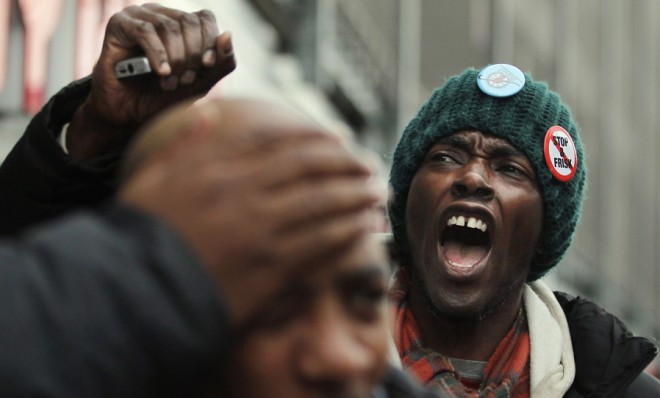The end of New York City's stop-and-frisk?
The New York City Council directly takes on Mayor Michael Bloomberg and his controversial policing tactic


A free daily email with the biggest news stories of the day – and the best features from TheWeek.com
You are now subscribed
Your newsletter sign-up was successful
In defiance of a veto threat from New York City Mayor Michael Bloomberg (I), the New York City Council approved two measures in the wee hours Thursday morning that would add significant oversight to the city's police department.
The two bills, known jointly as the Community Safety Act, are specifically aimed at curtailing the New York Police Department's controversial stop-and-frisk program, which critics contend is nothing more than an institutionalized form of racial profiling.
According to data from the New York Civil Liberties Union, the number of stop-and-frisks jumped from about 97,000 in 2002 all the way to a high of nearly 686,000 in 2011. Only two percent of all stops uncovered a weapon.
The Week
Escape your echo chamber. Get the facts behind the news, plus analysis from multiple perspectives.

Sign up for The Week's Free Newsletters
From our morning news briefing to a weekly Good News Newsletter, get the best of The Week delivered directly to your inbox.
From our morning news briefing to a weekly Good News Newsletter, get the best of The Week delivered directly to your inbox.
Further, over 86 percent of all stop-and-frisks in 2012 involved African-Americans or Latinos. Of the 10 precincts with the lowest percentage of minority residents, African Americans and Latinos still made up more than 70 percent of all stops in six of them.
One of the council's measures would create an independent inspector general to oversee the NYPD and make suggestions for how the department can be improved. The other would broaden the city's definition of "bias-based" profiling, and allow people to sue the police department not only over individual cases of alleged profiling, but over the entire practice itself.
"Bias-based profiling by the police alienates communities from law enforcement, violates New Yorkers' rights and freedoms, and is a danger to public safety," the text of the latter bill read.
In case there was any confusion about the City Council's intent, that legislation specifically called out stop-and-frisk as a "discriminatory practice" and made clear that the bill's intent was to rein it in.
A free daily email with the biggest news stories of the day – and the best features from TheWeek.com
The City Council expresses deep concern about the impact of NYPD practices on various communities in New York City. In particular, the Council expresses concern about the NYPD’s growing reliance on stop-and-frisk tactics and the impact of this practice on communities of color. In 2002, the NYPD made approximately 97,000 stops. By 2010, the number of stops had increased to more than 601,000. Black and Latino New Yorkers face the brunt of this practice and consistently represent more than 80 percent of people stopped despite representing just over 50 percent of the city’s population. Moreover, stop-and-frisk practices have not increased public safety, as year-after-year nearly 90 percent of individuals stopped are neither arrested nor issued a summons.
Bloomberg and Police Commissioner Ray Kelly have vociferously defended the stop-and-frisk program as an effective tactic and a necessary deterrent to street crime. Bloomberg framed his opposition to the two measures as a matter of life and death, saying, "This is not a game. This is a life-threatening thing.'
Kelly, for his part, suggested the bills could empower terrorists. "Take heart, al Qaeda wannabes," he said.
Bloomberg has vowed to veto both measures, though that may have little practical effect: Each passed with a veto-proof majority. Still, Bloomberg's vetoes would force the council to hold a new round of voting in a few months, giving the mayor more time to try and sway council members to abandon the legislation.
Jon Terbush is an associate editor at TheWeek.com covering politics, sports, and other things he finds interesting. He has previously written for Talking Points Memo, Raw Story, and Business Insider.
-
 Political cartoons for February 20
Political cartoons for February 20Cartoons Friday’s political cartoons include just the ice, winter games, and more
-
 Sepsis ‘breakthrough’: the world’s first targeted treatment?
Sepsis ‘breakthrough’: the world’s first targeted treatment?The Explainer New drug could reverse effects of sepsis, rather than trying to treat infection with antibiotics
-
 James Van Der Beek obituary: fresh-faced Dawson’s Creek star
James Van Der Beek obituary: fresh-faced Dawson’s Creek starIn The Spotlight Van Der Beek fronted one of the most successful teen dramas of the 90s – but his Dawson fame proved a double-edged sword
